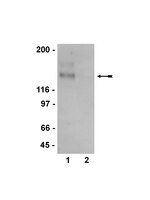Prostate cancer and the met hepatocyte growth factor receptor.
Knudsen, Beatrice S and Edlund, Magnus
Adv. Cancer Res., 91: 31-67 (2004)
2004
Pokaż streszczenie
The hepatocyte growth factor/scatter factor (HGF/SF) and its receptor, the Met protein tyrosine kinase, form a classic ligand-receptor system for epithelial-mesenchymal communications in the normal and cancerous prostate. This review illustrates the expression and activities of HGF/SF and Met during prostate development, homeostasis, and carcinogenesis. The participation of HGF/SF in the morphogenetic program of rodent prostate development, the role of Met in normal human prostate epithelium, and underlying mechanisms of deregulated Met expression in localized and metastatic prostate cancer are discussed. On the basis of the commonly observed overexpression of Met in metastatic prostate cancer, HGF/SF-Met-targeted imaging and therapeutic agents can now be applied toward diagnosis and treatment. | 15327888
 |
c-Met: structure, functions and potential for therapeutic inhibition.
Ma, Patrick C, et al.
Cancer Metastasis Rev., 22: 309-25 (2003)
2003
Pokaż streszczenie
Studies on signal transduction pathways have generated various promising molecular targets for therapeutic inhibition in cancer therapy. Receptor tyrosine kinases represent an important class of such therapeutic targets. c-Met is a receptor tyrosine kinase that has been shown to be overexpressed and/or mutated in a variety of malignancies. A number of c-Met activating mutations, many of which are located in the tyrosine kinase domain, have been detected in various solid tumors and have been implicated in invasion and metastasis of tumor cells. It is known that stimulation of c-Met via its natural ligand, hepatocyte growth factor (also known as scatter factor, HGF/SF) results in a plethora of biological and biochemical effects in the cell. Activation of c-Met signaling can lead to scattering, angiogenesis, proliferation, enhanced cell motility, invasion, and eventual metastasis. In this review, the role of c-Met dysregulation in tumor progression and metastasis is discussed in detail with particular emphasis on c-Met mutations. Moreover, we summarize current knowledge on various pathways of c-Met signal transduction, highlighting the central role in the cytoskeletal functions. In this summary is included recent data in our laboratory indicating that phosphorylation of focal adhesion proteins, such as paxillin, p125FAK, and PYK2, occurs in response to c-Met stimulation in lung cancer cells. Most importantly, current data on c-Met suggest that when mutated or overexpressed in malignant cells, c-Met would serve as an important therapeutic target. | 12884908
 |












